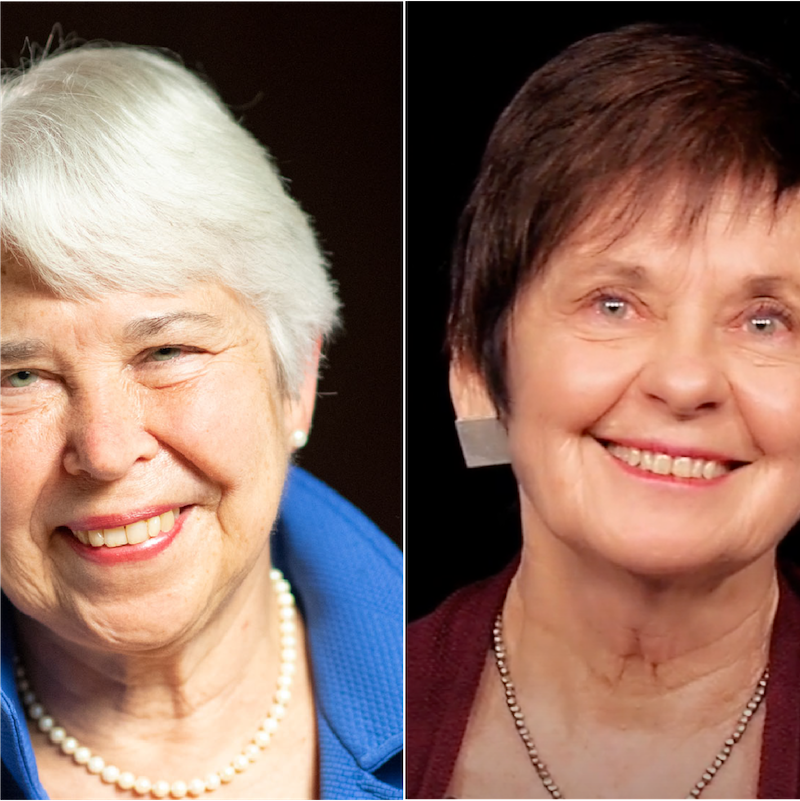
Carol Christ, left, and Susan Van Dyne
Carol Christ retired as chancellor of UC Berkeley in 2024; she has also served as president of Smith College. She taught in the English Department at Berkeley for many decades. Susan Van Dyne earned her Ph.D. from Harvard and taught at Smith College for four decades. She’s written about Syliva Plath’s poetry and Alison Bechdel’s queer graphic memoir Fun Home. They are teaching “Women Writing Age in Fiction” with us this spring.
How do you two know one another?
CC: I went to Smith in 2002 to become their 10th president. I met Susan soon after I got there. But we got to know one another really well after Susan and her wife moved to Berkeley. During the pandemic we began to see each other regularly. We started out with Zoom cocktails and quickly decided we were a pod.
Did the idea for the course bubble up during cocktails or some less festive time?
SVD: I think we were taking a walk at Sea Ranch when we came up with the idea. We were talking about writers that interested us most. It turned out that they were women writers — no surprise — but also that they were writing about aging in a way that resonated with us. The more we talked, the more excited we got about the subject. The idea of offering a course at OLLI on the older woman protagonist surfaced naturally after that. OLLI members seemed like the perfect cohort to embrace it.
CC: As I've gotten older, I've become very interested in fiction about aging. I always look to books for ways in which I can reflect on my experience and the experiences of other people. Early in my teaching career, I taught so many courtship and coming-of-age novels. In the works we’re going to discuss, we have older protagonists. They’re not dealing with marriage or early adulthood decisions. They’re dealing with issues of relationships, loss, empathy, community.
SVD: Having protagonists who are women doesn't mean that men are absent. They’re present, just not central to the story.
CC: One of the things I like about these books is that they take women who would have been comic characters on the fringes of another novel, and makes you think about what made her that way, what brought her to this place in her life, what are her reflections, what are her choices?
Another thing that surprises and interests me about these books is how much humor there is in them. It’s not all gloom and doom and end of life at all. They also inspire so much thinking — they did for me — about your own relationships with your children when they were younger and as adults, coming to terms with yourself as a parent, with what was good and what wasn't so good. They’ve caused a great deal of reflection.
Was it hard to narrow down the list?
CC: That was really hard. We focused on getting books that talk to each other, because it's not fun to teach if you don't have books that interact in some meaningful way. So that was part of our decision making.
SVD: We also thought about what we can reasonably ask members to do. This is a four-week course, in which we’ll discuss a novel a week. But one of the novels is quite short and two are essentially short stories. The longest is Three Things About Elsie, by Joanna Cannon.
We're both very devoted to this being a discussion-based class, not a lecture class. We have all sorts of ideas in mind for making that happen — how we’ll share time with each other, how we’ll get started with questions rather than answers.
CC: There are lots of different ways of talking about fiction. One is, of course, talking about character, and there are a lot of things to say about character, and the author's choices about how they tell the story.
SVD: I've always found OLLI members extremely engaged and well read and have a wide range of references, so I can't imagine they’d be anything but tickled to have these women protagonists in their lives.
Carol, I imagine it’s been a while since you’ve taught. What are you most looking forward to?
CC: I taught during the pandemic so it hasn’t been that long. But I’ve never taught older adults. Susan has told me what it’s like teaching OLLI members, and how engaged they are. I’m really looking forward to it.